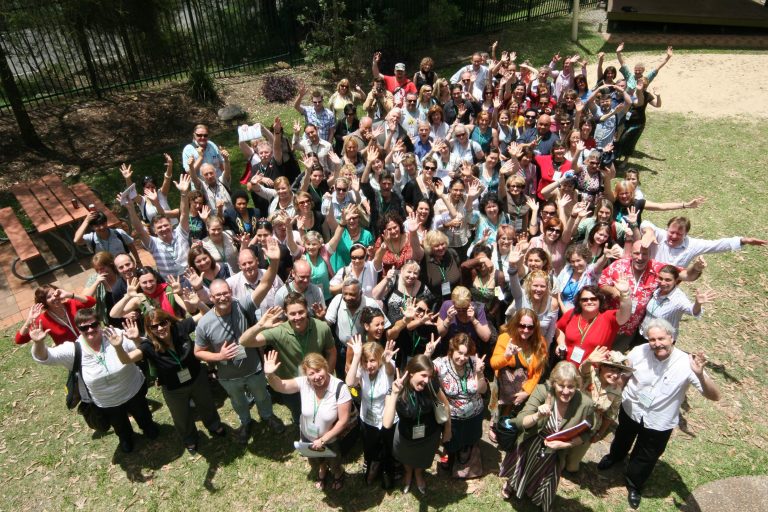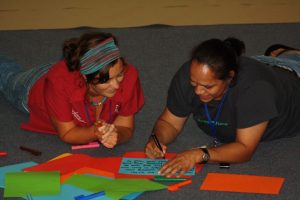An influential overview By Dee Brooks & Judi Geggie
The following paper has been written from the perspective of two former staff members from the Family Action Centre (FAC), University of Newcastle; a strengths-based centre that was an early adopter and pioneer of ABCD work in Australia. The authors have both since left the employment of the FAC, yet, continue to support the work of ABCD in their current roles. They would also like to note the influential work undertaken by other Australian ABCD practitioners and supporters, particularly Ric Thompson, Chris Dureau, Peter Kenyon, Amanda Howard and Ted Smeaton (vale), who have all been major influencers in the development and application of ABCD in Australia.
When reflecting on the way in which the ABCD approach has impacted on policy and practice in Australia over the last 30 years, we must look for the use of the underlying principles, language and strategies that are utilised in community development work, rather than looking for the explicit naming of the implementation of the ABCD Model. When reflecting over the history of ABCD in Australia and reviewing the early meetings, conversations and consultancies and the focus of government policies at a state and a national level, it is clear that ABCD had a significant influence on shifting Australian practice from a deficit framework to one of abundance.
For Government in Australia and for service providers, there seems to be a tendency to learn and extract from a variety of avenues that are helpful and relevant and to create your own model for your particular work at hand. Our governments often appear to not explicitly adopt one model, allowing them to be more accountable to the political powers and to the sector and not to be seen as favouring one model or one individual or group of people who promote it. For instance last year when a representative of a government department, who through dialogue, was clearly using ABCD principles, was asked why they weren’t explicit about their ABCD approach. Their response was, “We can’t be seen to endorse one particular model” therefore, their history of adopting ABCD was lost, but the ABCD principals that underline their policies and guidelines remain.

During the late 1990s and 2000 until 2010, the FAC gained sponsorship from the Australian government for the “Building Family and Community Strengths” Conferences for many years and this included two ABCD Asia Pacific Conferences in 2008 and 2010. Many services and organisations, from across the Asia Pacific region, delivered talks on their use of ABCD in their approach and subsequently gained their own further funding for future ABCD work. It is therefore assumed that the Australian government clearly endorsed the ABCD approach to working with families and communities across our nation.
At times, over the many years of delivering ABCD training to thousands of people from many organisations and departments, which are later discussed, professionals working at a service provision or a management level have said, “This fits so well with my role!” and when appropriate, it becomes an opportunity to provide them the background information about their organisation or department’s history of the adoption of ABCD principles and is often met with delight and surprise.
In 1999 after the first Family and community Strengths conference held by the FAC, University of Newcastle, a local ABCD Network was established and this became a vehicle to discuss the application of the ABCD principles to both academic, bureaucratic and service delivery aspects of family and community work. Eventually this network became more representative of the Australian region and eventually included the Asia Pacific region.
From 2000 until 2010, Jody Kretman and Mike Green (ABCD for Inclusion), who are ABCD Institute founders and faculty members respectively, were hosted by the FAC to provide ABCD training to practitioners throughout Australia. These three-day workshops were popular and enabled the FAC to empower local trainers to be able to deliver training throughout Australia from a local perspective.

In 2009, the above mentioned, unfunded network, the ABCD Asia Pacific network, was formally founded by a group of Australian and New Zealand practitioners and was initially managed by the FAC. Dee Brooks became the Facilitator and Ted Smeaton became the Chair. The network has now merged with ABCD in Action (a global network) and continues to support practitioners, throughout the Asia Pacific, to this day.
So, let’s have a look at who was influenced, discover the fundamental history of Australian asset-based community development and celebrate ABCD in Australia!
Communities for Children (CfC):
CfC was one of three models of service delivery funded under the Australian Government’s Stronger Families and Communities Strategy 2004, to improve community capacity and improve the community context for children and their families in 45 disadvantaged geographic areas around Australia to develop and implement a whole-of-community approach. This model utilised a strong bottom up approach, encouraged asset mapping and building partnerships and initially employed area managers who had a working knowledge of ABCD.
ABCD’s early contributions that influenced the development of C4C model:
2001: The FAC, University of Newcastle organised a visit by Jody Kretzman to Australia and whilst in the country Jody Kretzman and Ingrid Christiansen from the ABCD Institute and Judi Geggie, FAC, met with Federal Government in Canberra, ACT and Premier’s Department in Sydney NSW.
2002: Jody Ketzman and Judi Geggie presented ABCD in Action at the Federal departments family and community section, and it was televised through the governments teleconferencing network through the department’s state offices.
2004: Federal Department of Family & Community Services Panel of Experts of the Stronger Family and Communities Strategy (including Judi Geggie and Gus Eddy,FAC) provided ABCD training in Queensland and NSW.
2004: The Family Action Centre (FAC) submitted and successfully gained funding, in partnership with the Smith Family, for Communities for Children (CfC). This position stayed with the FAC for a decade and is currently ongoing, with ABCD trained practitioners, through the auspice of the Smith Family.
Community Drug Action Teams (CDAT) Australian Drug Foundation (ADF):
Established in 2000 and initially part of the NSW Department of Health, CDAT’s revolve around community members, local services providers and business-people who share a desire to work with others to make a difference and a passion for making their community safer, healthier, stronger, and more connected across New South Wales.
ABCD’s early contributions:
2004: ABCD training, Simone Silberberg, Family Action Centre, University of Newcastle delivered training to all CDAT’s across the Hunter Valley
2008: NSW Department of Health in conjunction with CDAT’s publish “Building Successful Community Drug Action Teams: A Practical Guide” and name ABCD as a foundational methodology
2009: ABCD training, Dee Brooks, Family Action Centre, University of Newcastle delivered training to all CDAT’s across the Hunter Valley, New England, Sydney and South Coast communities
2010: Dee Brooks presented previous ABCD undertakings and outcomes at annual CDAT Conference, Wollongong, NSW
2012: Dee Brooks co-designed and facilitated CDAT Hunter New England Forum, Newcastle, NSW.
2016: Dee Brooks was invited as an external assessor for the 2016 funding round for NSW CDAT’s and as a panel judge for annual CDAT conference awards in Sydney, NSW.
Ability Links NSW & The National Disability Insurance Scheme (NDIS):
The Ability Links NSW program was developed as a response to the upcoming NDIS and is a way of connecting people with a disability, their families and carers in the community. Linkers work closely with people with disability, their families and carers to support them to fulfill their goals, hopes and dreams. Providers are the organisations that offer services to people with disability and/or mental health and the community. Linkers are auspiced by these Providers.
Note: The NDIS launched in July 2013 to ensure that people with a disability and/or mental health and their carers receive full access to the support they need, the NDIS has a vision of a community that values people with disabilities.
ABCD’s contributions:
2010: ABCD training, Department of Ageing, Disability and Home Care (ADHC)
2011: Ted Smeaton (Vale) advised ADHC on the role of a ‘linker’ and co-developed the Ability Links job description
2013-2015: Dee Brooks, Family Action Centre, University of Newcastle (& later the Jeder Institute) rolled out ABCD training for the Ability Links program for 280 Linkers across NSW
2013: ABCD Staff Training for Department of Aging, Disability and Home Care (ADHC); Newcastle, Sydney, Wollongong, Northern Rivers Region
Defence Community Organisation (DCO) Australian Defence Force (ADF):
The DCO believes that Defence families are strongest when they are connected with their local communities. DCO provides a number of support and information services to help individuals and families connect with and contribute to their community, and to engage the wider community in support of Defence families.
ABCD’s contributions:
2010-2012: ABCD training across Australia with all area offices in each state and territory provided by Dee Brooks & Graeme Stuart, Family Action Centre, University of Newcastle in conjunction with Maureen Greet, DCO.
2012: Defence Family Forum, Sydney Convention and Exhibition Centre, Darling Harbour with process facilitation provided by Dee Brooks and Graeme Stuart, FAC, University of Newcastle.
Engagement Australia University-Community Engagement (UCE):
University-Community engagement has increased in importance and popularity over the past decade in teaching course work, expanding community outreach, guiding student placement and implementing university staff in-reach.
ABCD’s contributions:
2005: ABCD incorporated into the Bachelor of Social Work, Bachelor of Development Studies and the Bachelor of Arts/Bachelor of Primary degree at the University of Newcastle
2007: ABCD incorporated into the Capacity Building in Human Services – Masters of Social Change studies at University of Newcastle
2008: ABCD incorporated into the Community Engagement and School and Community Partnerships studies at University of Newcastle
2013: ABCD & Participatory Leadership facilitation for Engagement Australia Annual Conference
2015-2016: ABCD Masterclasses delivered in Surabaya and Makassar, Indonesia for the SILE project’s Islamic Universities
2016: ICONUCE Masterclass, Surabaya, Indonesia
These are just some of the FAC and Jeder’s historical moments. There have been many other areas influence by ABCD, over the years, and below are some of the sectors or areas that have also been impacted by this work, including the future, ongoing work of ABCD in Australia which is also expanding into a diverse range of communities.
Local government
Numerous local government departments have utilised the skills and training options of ABCD consultants ranging from one-day workshops to medium and long-term projects. The impact on communities across Australia can be noted by the stories shared by service providers within the community and they are diverse. Peter Kenyon from the Bank of IDEAS has led the ABCD implementation, particularly in Victoria with the Municipality Association of Victoria (MAV), and in other states of Australia, for many decades. Dee Brooks has worked with many local councils over the past 15 years and many of the earlier ABCD workshops led by Jody Kretzman was attended by numerous local government personnel.
Disaster Recovery and community resilience:
The disaster recovery and emergency management sector has applied ABCD in various ways over the years. From seeking support and guidance for Australian Emergency Management Institute’s (AEMI) policies and teaching frameworks to explicitly mentioning ABCD in the current Emergency Management Victoria’s community strategy. Michelle Dunscombe, who has been trained over the years by Dee Brooks and Peter Kenyon, has worked in the disaster recovery and emergency management sector for many years in Victoria and supports groups like Firefoxes and the Rivers and Ranges Leadership program by applying the principles of ABCD.
AusAID: (now DFAT)
Since 2005, Chris Dureau has championed ABCD in the international development sector. Chris has worked with a diverse range of communities both in Australia and around the world. Country programs where ABCD and other strength based thinking has been introduced by Chris Dureau through the Australian Development Program include:
- Pacific: Papua New Guinea, Solomon Islands, Vanuatu, and Samoa
- Asia: Timor-Leste, Indonesia, Thailand, Vietnam, and Myanmar
- Africa: Ethiopia (Afar Pastoralists), Kenya, Tanzania, Malawi, Mozambique, South Africa (Lesuto)
Refugee and Asylum Seeker communities:
Both Peter Kenyon and Dee Brooks have worked intermittently with the NSW Service for the Treatment & Rehabilitation of Torture & Trauma Survivors (STARTTS) and have supported them through ABCD workshops. More recently, Dee Brooks has supported the Australian-Bhutanese community and the Australian-South Sudanese community to move their community-led initiatives forward. Om Dhungel has been a pivotal part of the ABCD practice being undertaken in this sector.

The Ochre Report:
The Ochre Report which is the NSW Government Plan for Aboriginal Affairs that is focused on revitalising and promoting Aboriginal language and culture, creating opportunities, increasing people’s capacity, providing choice and empowering people to exercise that choice, as well as giving them the tools to take responsibility for their own future. Dee Brooks and Michelle Dunscombe, Jeder Institute, are currently in development with Aboriginal Affairs to deliver ABCD workshops across NSW.
The Current Nature of ABCD in Australia: On the shoulders of giants
There is no one way that ABCD is applied in Australia. Some community-based ABCD groups start small and informal and are not always guided by local government or dollars, and yet, others are guided and funded. Each group we support, discuss with or discover have a variety of ways they apply ABCD and often times, it is in conjunction with other methodologies like Appreciative Inquiry, Results Based Accountability, Collective Impact, Art of Hosting and more.
Individual practitioners are having an impact in various areas including, health, housing, defence, homelessness, education, settlement, veterinary science (yes, really!), youth work and the list goes on…
At the heart of what these individuals, groups and organisations are doing is community empowerment and the passion to work differently to bring stakeholders together and to create productive and powerful change.
So what is the current nature of ABCD in Australia? We believe it is localised, formal, informal, guided, emergent but, above all, empowering and connected!






